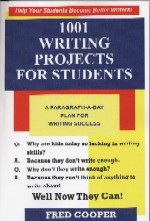1001 Writing Projects for Students: A Paragraph-A-Day Plan for Writing Success is a very simple-to-use resource that recommends that students write for about fifteen minutes a day on the topics presented in this book.
Most homeschooling parents and teachers would love to have their students write every day, but the challenge of coming up with topics is a huge hurdle for students and a time-consuming one for parents and teachers. This book solves that problem with about five years' worth of paragraph topics.
The first 700 topics are suitable for students from about fifth grade through high school, but probably best for grades five through eight. The last 301 topics should be saved for high school students. Almost all of the topics require students to write about something of which they should already have knowledge. For example, two topics suitable for younger students are “Birthday Presents: Write a paragraph explaining why you think we have the tradition of giving gifts on birthdays.” and “Capital Letters: Write a paragraph explaining three situations in writing in which letters must be capitalized.”
In contrast, upper level topics sometimes require more knowledge or critical thinking. A few examples: “Democracy: Do you think that democracy always produces the best result in government? Write a paragraph expressing your opinion.” “The Artist’s Worldview: Write a paragraph explaining how an artist can express his worldview through art.”
Many topics such as those that address worldview, church, virtues, and the creation/evolution question tend to appeal to Christian teachers and parents. There's also a very slight and subtle bias toward conservative, limited-government views as evidenced by topics such as, “Write a paragraph explaining the meaning of the expression, 'a government of laws, not of men'" and another that questions whether government or individuals should have responsibility for education. Just raising such topics influences the way students think. However, most controversial topics are presented in an open-ended fashion for students to present their own opinions such as one on government funding of the arts.
In response to the topics, students write descriptions, instructions, opinions, letters, dialogues, explanations, definitions, and other types of responses. Generally, these compositions should be a single paragraph, but I can see that many of the upper-level topics could easily expand into multi-paragraph essays.
The author recommends that students work through the topics in order, although older students might begin around the 700th topic if they want to start with the more challenging ones.
No preparation or planning is required. Just bookmark the page you are on and students can easily find each day's topic themselves or parents or teachers can quickly present the topic.










